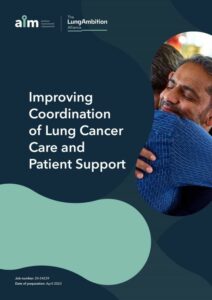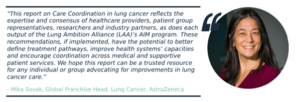The Lung Ambition Alliance has published a new report on ways to improve healthcare for people with lung cancer.
Improving care coordination in lung cancer: identifying obstacles and the means to overcome them.
Patients with lung cancer who also have moderate to severe depression can be more likely to experience inflammation and may be at a greater risk for poor outcomes, a single study has shown.1 Emerging findings like these suggest that a patient’s mental health during cancer treatment can play a crucial role in their overall health, reinforcing the importance of treating people with lung cancer beyond their initial diagnosis. This more holistic approach is central to the concept of ‘Care Coordination.’

Care Coordination refers to the synchronized delivery of the various aspects of a patient’s care – from medical care, like diagnostic tests, treatment and symptom management, to supportive care, like informational and psychosocial services.2 Coordination across these elements can improve the quality of care a patient receives and, in turn, their outcomes.3
Specific to lung cancer, the care pathway is complex and as an estimated 2.2 million people were newly diagnosed with lung cancer in 2020, it is also crowded.4 Many people newly diagnosed with lung cancer may enter health systems that lack the capacity to provide quality, coordinated care, including psychosocial support, leading to poor symptom control, medical errors and higher costs.5, 6 Further, a lack of coordination can lead to negative experiences that erode patients’ trust and receptiveness to their care, all elements that compound and amount to poorer outcomes.7,8
A new report, ‘Improving Coordination of Lung Cancer Care and Patient Support,’ 2 identifies the primary barriers to Care Coordination in lung cancer and provides a series of recommendations to overcome them.


Intended for policymakers at any level, the report organizes these recommendations and corresponding methods for measurement into three categories:
- Improve access to coordinated care through a defined pathway
- Sample recommendation: Conduct a holistic patient needs assessment ahead of the pre-treatment appointment
- Related measurement opportunity: Ahead of the initial and following appointments define the patient’s needs
- Enhance the capacity of health systems
- Sample recommendation: Establish a standard caseload for healthcare professionals that is sustainable and appropriate for each healthcare system
- Related measurement opportunity: Measure HCP caseloads against a baseline figure
- Address lack of access to coordinated information and psychosocial services
- Sample recommendation: Ensure information about lung cancer is made available before or at the time of a confirmed diagnosis
- Related measurement opportunity: Percentage of patients receiving written care plans or signposted information
These recommendations reflect the diverse perspectives and experiences of healthcare providers, patient group representatives, researchers and industry partners as convened by the LAA and its Ambition, Improvement, Measurement (AIM) program.
References:
- “Depression in association with neutrophil-to-lymphocyte, platelet-to-lymphocyte, and advanced lung cancer inflammation index biomarkers predicting lung cancer survival” by Barbara L. Andersen, et al, 24 February 2023, PLOS ONE. DOI: 10.1371/journal.pone.0282206
- Improving Coordination of Lung Cancer Care and Patient Support. Lung Ambition Alliance. Available at: https://www.lungambitionalliance.com/content/dam/open-digital/lungambitionalliance/en/pdf/AZ-LAA-Coordination-of-Care-Whitepaper-updated-final-0530.pdf
- Lubuzo B., et al. Coordination models for cancer care in low-and middle-income countries: A scoping review. Int J Environ Res Public Health. July 2022. 19(13):7906. Available at: https://doi.org/10.3390/ijerph19137906.
- World Health Organization. Lung: GLOBOCAN 2020. Available at: https://gco.iarc.fr/today/data/factsheets/cancers/15-Lung-fact-sheet.pdf.
- Gorin SS, Haggstrom D, Han PKJ, Fairfield KM, Krebs P, Clauser SB. Cancer Care Coordination: a Systematic Review and Meta-Analysis of Over 30 Years of Empirical Studies. Ann Behav Med. 2017 Aug;51(4):532-546. PMID: 28685390. DOI: 10.1007/s12160-017-9876-2.
- Looijmans, M., et al. Psychosocial consequences of diagnosis and treatment of lung cancer and evaluation of the need for a lung cancer specific instrument using focus group methodology. Support Care Cancer. 2018. 26(12):4177-4185. Available at: https://doi.org/10.1007/s00520-018-4291-1.
- Lubuzo B, Hlongwana KW, Ginindza TG. Lung Cancer Patients’ Conceptualization of Care Coordination in Selected Public Health Facilities of KwaZulu-Natal, South Africa. Int J Environ Res Public Health. 2022 Oct 25;19(21):13871. doi: 10.3390/ijerph192113871. PMID: 36360759; PMCID: PMC9657230.
- Corner J, Wagland R, Glaser A, Richards M. Qualitative analysis of patients’ feedback from a PROMs survey of cancer patients in England. BMJ Open 2013;3:e002316. doi: 10.1136/bmjopen-2012-002316
Date of Preparation: May 2023 | Document ID: Z4-54780
- World Health Organization. Globocan 2020 Fact Sheet. Available at: https://gco.iarc.fr/today/data/factsheets/populations/900-world-fact-sheets.pdf. Accessed June 2021.
- Global Lung Cancer Coalition (GLCC). About Us. Available at: https://www.lungcancercoalition.org/about-glcc.html. Accessed May 2019.
- Global Lung Cancer Coalition (GLCC). Statement of Purpose. Available at: https://www.lungcancercoalition.org/statement-of-purpose.html. Accessed May 2019.
- De Angelis R, Sant M, Coleman MP, et al. 2014. Cancer survival in Europe 1999-2007 by country and age: results of EUROCARE—5-a population based study. Lancet Oncol 15(1): 23-34.
- Cancer.Net. Lung Cancer – Non-Small Cell – Statistics. Available at www.cancer.net/cancer-types/lung-cancer-non-small-cell/statistics. Accessed August 2021.
- AstraZeneca. Imfinzi demonstrated unprecedented survival in unresectable, Stage III lung cancer with 43% of patients surviving five years. Available at https://www.astrazeneca.com/content/astraz/media-centre/press-releases/2021/imfinzi-demonstrated-unprecedented-survival-in-unresectable-stage-iii-lung-cancer-with-43-percent-of-patients-surviving-five-years.html. Accessed June 2021.
- NICE. The diagnosis and treatment of lung cancer (update). Available at https://www.ncbi.nlm.nih.gov/books/NBK99021/pdf/Bookshelf_NBK99021.pdf. Accessed May 2019.
- Midthun D. Early detection of lung cancer. F1000Research. 2016;5(F1000 Faculty Rev):739.
- Jones G, et al. Recent advances in the management of lung cancer. Clinical Medicine. 2018;18(2):s41–s6.
- Mascaux C, et al. Personalised medicine for nonsmall cell lung cancer. European Respiratory Review. 2017;26:p. 170066.
- IASLC.org. IASLC Pathology Committee. Available at https://www.iaslc.org/research-education/iaslc-pathology-committee. Accessed August 2019.
- World Economic Forum. Partnership for Health System Sustainability and Resilience. Available at https://www.weforum.org/phssr. Accessed June 2021.
- Health Policy Partnership. https://www.healthpolicypartnership.com/project/health-system-sustainability-and-resilience/ Accessed June 2021.
- de Koning HJ, et al. The New England Journal of Medicine. Reduced Lung-Cancer Mortality with Volume CT Screening in a Randomized Trial. Available at https://www.nejm.org/doi/full/10.1056/NEJMoa1911793. Accessed June 2021.
- Yang P. Journal of Thoracic Oncology. National Lung Cancer Screening Program in Taiwan: The TALENT Study. Available at www.jto.org/article/S1556-0864(21)00360-9/fulltext#articleInformation. Accessed June 2021.
- IASLC.org. IASLC Successfully Pilots Early Lung Imaging Confederation Project. Available at https://www.iaslc.org/iaslc-news/press-release/iaslc-successfully-pilots-early-lung-imaging-confederation-project. Accessed August 2021.
- Giroux DJ et al. The IASLC Lung Cancer Staging Project: A Renewed Call to Participation. Journal of Thoracic Oncology. 2018;13(6):801-809.
- Jemal A, Ward EM, Johnson CJ, et al. 2017. Annual report to the nation on the status of cancer, 1975–2014, featuring survival. J Natl Cancer Inst 109(9): 1-22.
- Noone AM, Howlader N, Krapcho M, et al. 2018. SEER cancer statistics review, 1975-2015. Bethesda, MD: National Cancer Institute.
- Zappa C, Mousa SA. 2016. Non-small cell lung cancer: current treatment and future advances. Transl Lung Cancer Res 5(3): 288-300.


